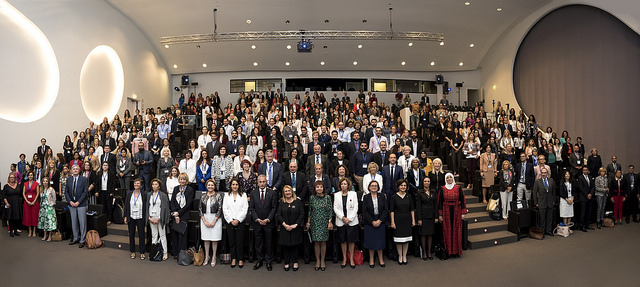Lisbon, Portugal - 10-11 October 2018
UNIDO ITPO Italy will participate in the Women4Mediterranean conference 2018

Lisbona, 11 ottobre 2018 - In the framework of the UNIDO project "Promoting woman empowerment for inclusive and sustainable industry in the MENA region", UNIDO ITPO Italy collaborated to organize two roundtables in Lisbon during the High Level Women4Mediterranean Conference. The Forum constitutes the major regional platform to discuss, exchange experiences and promote women’s participation in the public, economic and civil life to bring solutions to regional challenges, creating impact by gathering the most relevant stakeholders and leaders from the Euro Mediterranean region. Around 50 women and men from the MENA region countries participated in the discussions of both roundtables.
The first workshop, entitled "Information and Communication Technologies for gender equality and women empowerment", aimed to raise awareness on the opportunities offered by the ICT sector for women’s economic empowerment, particularly in the MENA region and with African and European countries. Moreover, it dealt with not only the pre-requisites to take advantage of these opportunities in terms of infrastructure, ICT ecosystem, skill development, but also in terms of opening new Markets and business opportunities with other regions. ICTs can provide great opportunities for gender equality by raise women’s voice not only in their communities but at the global level.
The recommendations from this roundtable highlighted the need to foster innovation and an analytical mindset, and to provide opportunities for the development of ICT and digital skills. This includes encouraging girls and women to participate in digital events and initiatives, such as hackathons. There is a need to showcase role models of female entrepreneurs in ICTs and to provide appropriate mentoring to girls and women aspiring to become entrepreneurs, to break cultural stereotypes and preconceptions of women in the digital economy, particularly in the MENA region. Develop soft skills and build confidence, fight misconceptions and self-censorship leading to the idea that there are jobs for women in the digital economy. Offer financial services adapted to start-up needs (i.e. venture capital, crowdfunding) and raise awareness among investors on the profitability of women-led businesses
The second one, organized with UNIDO and FAO, was entitled "Women shaping the future of food technologies". Today, food and drink industry is one of is the largest manufacturing sector worldwide and technologies are already reshaping the way in which food is produced and food demand is managed. With scarcity of land and water resources and a safe and high-quality food increasing global demand, using technologies and innovative solutions for food represents a huge business potential and job opportunities creator for women. This goes from methods of producing, packaging, conserving and distributing foods, to research into new formulations and technologies to comply with new demands for quality, safety and sustainability standards.
The workshop focused on raise awareness on the business opportunities offered by the transformation of the food sector and underlined the prominent role women in reshaping food technologies. To support rural women empowerment, the following was recommended by the participants: to invest in infrastructure, logistics and connectivity to reduce isolation, facilitate payments and access to markets; support innovation and investment in modern and sustainable agriculture and agro-industry (e.g.: Smart Village in Turkey, blockchain technology to reduce waste, facilitate traceability and control of agro-food products); facilitate the transition from the informal to the formal sector; encourage women’s financial inclusion and develop adapted financial products; invest in data collection, analysis and dissemination of sex-disaggregated data ; and adopt a multifaceted approach in designing projects targeting rural women that should include soft skills, financial literacy, rights awareness and education, which should also involve men.